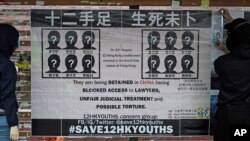The U.S. State Department is calling on China to respect the freedom of a Chinese rights lawyer linked to the defense of one of 12 pro-democracy activists who attempted to flee Hong Kong for Taiwan in a small boat.
“We remain alarmed by human rights violations and abuses in China and call on the PRC (People's Republic of China) to respect the fundamental freedoms to which their citizens are entitled consistent with China’s international obligations and commitments,” a State Department spokesperson told VOA on Thursday via email.
Chinese human rights lawyer Lu Siwei told VOA Mandarin by phone on May 10 that two days earlier he had been barred from leaving the country. Officers at Shanghai Pudong Airport kept him from boarding a Delta Air Lines flight to the U.S. where he was to participate in the Hubert H. Humphrey Fellowship Program, a one-year nondegree course of study for midcareer professionals sponsored by the State Department.
Lu did not specify where he was expecting to pursue the fellowship, and program administrators have not replied to VOA requests for information about Lu’s situation and the participation of Chinese officials. A request for comment to China’s embassy in Washington has gone unanswered.
Hong Kong 12
Lu, who is based in Chengdu, Sichuan province, in western China, was one of two lawyers who represented 12 Hong Kong residents, the so-called Hong Kong 12, after they were intercepted at sea by Chinese authorities as they tried to flee to Taiwan on August 23, 2020.
In January, the Sichuan Provincial Judicial Department revoked his license to practice law and the Sichuan Provincial Lawyers Association, a government-controlled entity, revoked his membership.
In March, Sichuan authorities banned Lu from going to Beijing to obtain a visa at the U.S. Embassy and warned he would not be allowed to leave China.
On Thursday, the State Department also called on China to restore the livelihood of Lu and other disbarred human rights lawyers.
“We condemn the actions taken by the PRC to disbar Lu Siwei following his efforts to represent the Hong Kong 12. We call on the PRC to restore the livelihood of Lu Siwei and the many lawyers who have been unfairly disbarred. Human rights lawyers should be applauded, not punished, for their commitment to helping their fellow citizens,” a State Department spokesperson told VOA.
Intercepted at sea
The Chinese coast guard intercepted the Hong Kong 12 about 70 km southeast of Hong Kong. Most of the activists, aged 16 to 33, faced charges linked to the massive pro-democracy protests of 2019.
The activists took to sea in August after Beijing enacted a sweeping national security law in Hong Kong in June.
The interception provoked international outcry. China’s Foreign Ministry spokeswoman Hua Chunying responded in a tweet, "Seriously?! Fact check: The 12 people were arrested for illegally crossing the border in waters. They are not democratic activists, but elements attempting to separate #HongKong from China."
Ten of the 12 Hong Kong democracy activists stood trial in China in late December. The court adjourned without a verdict after a closed hearing. But within days the defendants received sentences between seven months and three years. Two minors were returned to Hong Kong.
Lu has said he was unable to meet his client while representing him.
Lu told VOA that at the Shanghai airport he was detained for two hours without access to his phone. “They later informed me that there’s an exit ban on me for national security reasons,” Lu said, adding that he did not know when the ban would be lifted.
Lu said he was not sure if he was targeted as an individual or if authorities were targeting the fellowship program.
“Many Chinese officials are participating or have participated in the Humphrey program, so I thought the officials would be OK with people-to-people exchange,” he told VOA. Fellowship administrators have not replied to VOA requests to confirm the participation of Chinese officials.
'An illusion'
Chen Jiangang, a Chinese human rights lawyer who is now based in the U.S. after leaving China, told VOA that the restriction placed on Lu reflects the limitations Beijing is placing on rights lawyers who practice in China.
“I guess we had an illusion that if the Chinese Communist Party would allow scholar exchanges between the U.S. and China, it will lead to de-escalation of tensions between the two sides,” he said. “But as China steps up its warrior diplomacy, I think we should have predicted that Lu would be barred from leaving the country.”
Analysts say that in recent years China has adjusted its suppression strategies on rights lawyers. Instead of putting them into prison, Beijing is using administrative methods such as revoking their licenses or ordering their law firms to dissolve.
“There is no procedure, no way to appeal the exit ban," said Chen. “I’ve seen so many cases where activists and rights lawyers basically lost their freedom of movement.”





